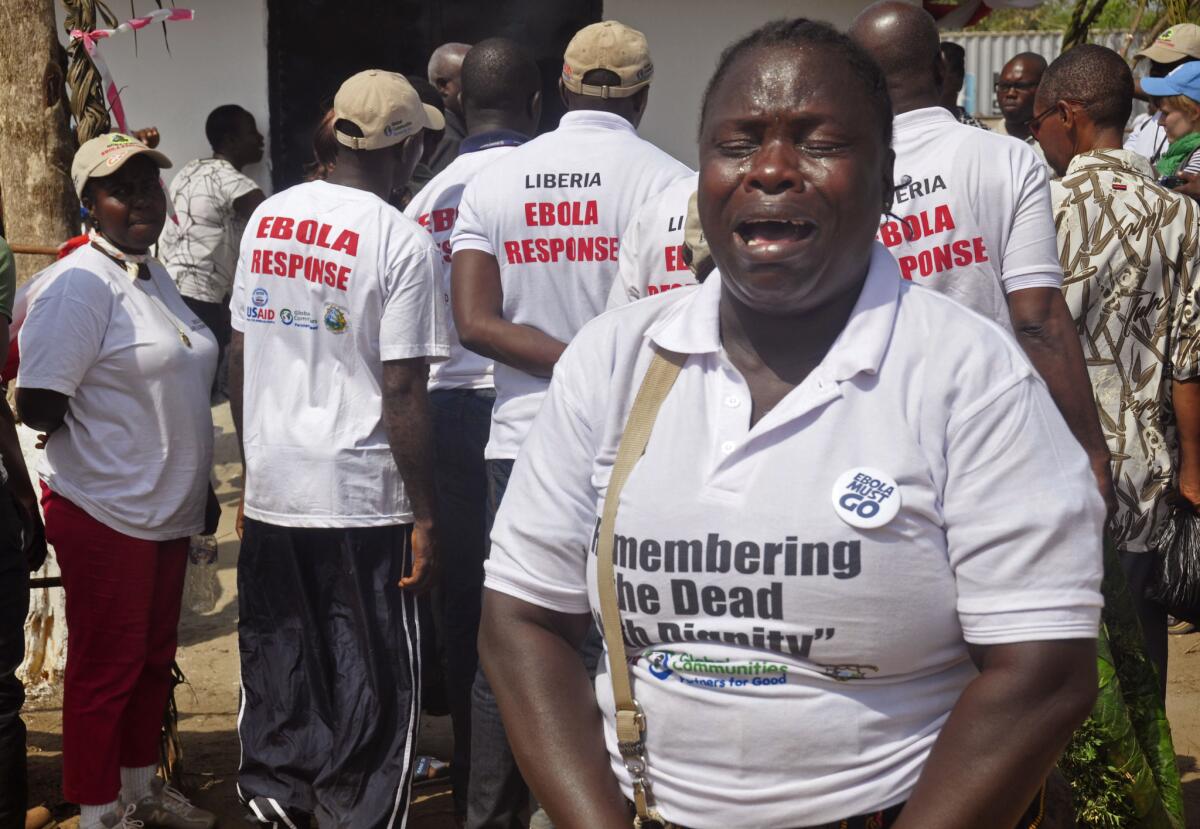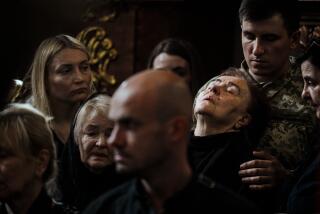Ebola’s lingering pain: Liberians rue use of cremation

Reporting from Monrovia, Liberia — In Liberia, they call it Decoration Day, a time of pain, celebration and memory when people visit graveyards to honor their dead, cleaning the graves, whitewashing them or painting them in bright colors.
But Wednesday, the first Decoration Day since the main brunt of the recent Ebola epidemic hit Liberia last year, was heartbreaking, not just because of the loss of 4,117 Liberian lives, but also because in most cases there is no grave to decorate.
Cremation, a practice so alien here as to be almost unthinkable, was widely used during the Ebola epidemic, compounding the grief for many families. In Liberian society, death demands a “decent burial” -- and a body is required.
Early in the crisis, suspicions about cremation led people to hide bodies, to try to have them buried. Government officials reported that some Liberians bought fake death certificates on the black market, showing a cause of death other than Ebola. That allowed them to bring the bodies of loved ones to funeral parlors for burial.
Authorities turned to cremation in Monrovia, Liberia’s capital and largest city, because people were dying by the hundreds each week at the height of the crisis -- and the bodies of Ebola victims are so contagious that handling them is extremely dangerous. Some neighborhoods rejected burials of Ebola victims nearby.
One reason the virus spread so fast last year was because of traditional burials, where bodies are washed and dozens of relatives touch the dead.
Outside Monrovia, at a crematorium near the airport, dozens of bodies were brought each day to be burned.
The bodies of more than 3,000 people, reduced to ashes, are contained in 19 drums from the Monrovia crematorium. The ashes will be buried in a 25-acre site by the Robert Field Highway, selected as an Ebola memorial by the government of Liberia, which recently declared the release of the country’s last Ebola patient from treatment.
For many grieving survivors, it hurts deeply to pass Decoration Day without being able to mark a loved one’s death at a graveside.
Sianneh Beyan, 28, who is jobless, lost her husband, a driver, after he contracted the virus from a passenger he did not know was sick. She then lost her sister, who had helped to care for Beyan’s dying husband.
She had called an ambulance to take her husband to a treatment center, but by the time it came, he was dead.
“He died in the house,” said Beyan, who wore a simple black skirt and a shirt with black pinstripes Wednesday. She wiped away her tears. “I’m angry that they burn[ed] my husband. They should have buried him like they are burying people now. They got my husband to dust. I’m feeling bad that tomorrow I can’t show my children their father’s grave.”
She still hopes to get her husband’s ashes, but the ashes of victims are mingled.
“I have no grave to decorate on this day. Let the government give me my husband’s dust so I can find a place to put it,” the widow said.
The disease was cruel and swift. Some children were left without parents. Some mothers or fathers were left alone after all their children and their spouse died. Among the hardest hit were health workers, caregivers and those who tried to help by taking desperately sick people to hospitals. At the height of the crisis, the sight of wheelbarrows ferrying stricken patients to hospitals was common. Outside hospital gates, people lay retching, vomiting and pleading for help.
Relatives watched their loved ones placed into quarantine in Ebola treatment units, and often it was the last time they saw them. For some, not seeing the body made the loss harder to accept.
Johnson Wleh, 32, a trader, went to the Robert Field Highway burial site Wednesday, hoping to locate the ashes of his brother, who left Wleh his four children to raise.
Wleh looked disheartened, with his face unshaven, his shoulders sagging. He was shocked to learn that his brother’s ashes were mixed with those of others.
“We are not used to this burning body thing. I’m confused with this dust of our relative, because they join everybody and burn them, so I want to see how they will tell which dust is for me or the other person.
“I never thought that my brother was going to end up like this. I’m vexed with the way they handled his body, but at that time [there was] nothing I could do,” Wleh said. “This disease has made good people to be buried like animals. It has destroyed lives and broken families.”
Decoration Day has been marked in Liberia for 99 years on the second Wednesday in March. All flags in the nation were lowered to half-staff at a minute past midnight.
David Sonnie, 43, a trader with four children, lost his brother, sister-in-law and niece to Ebola.
“My young brother took sick and infected his wife and one of his daughters, who later died like him,” he said. Their cremations added to his grief.
“This burning of [a] body is very discouraging and disheartening,” Sonnie said. “You will not see your relatives’ graves.
“If they give us the dust, we will dig a grave and put it there just to have [a] place to come every Decoration Day.”
About 24,000 people were infected in three West African countries and nearly 10,000 died, with neighboring Guinea and Sierra Leone still struggling to contain the virus. The World Health Organization last week warned that unsafe burials were continuing in those countries.
Beginning on Christmas Eve, as the virus waned, Liberia began allowing burials for Ebola victims in Monrovia again.
The country’s last Ebola patient, a 58-year-old schoolteacher Beatrice Yardolo, was released last week.
Students returned to school last month, although many Liberians are wary of sending their children back, fearing another outbreak. The government recently announced that basketball games, banned during the crisis, may resume.
Memories and sorrow remain. But life is slowly getting back to normal.
Special correspondent Rogers reported from Monrovia and Times staff writer Dixon from Johannesburg, South Africa.
Follow @RobynDixon_LAT for news from Africa.
More to Read
Sign up for Essential California
The most important California stories and recommendations in your inbox every morning.
You may occasionally receive promotional content from the Los Angeles Times.










